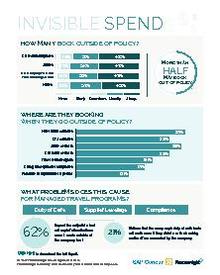The impact of millennials on corporate travel and expense – and why it may surprise you
Within the past year, millennials (born 1981-1997) surpassed baby boomers (born 1946-1964) as the largest living generation in the U.S. and make up the largest share of employees in the American workforce, according to Pew Research. This generation, totaling more than 75 million people, has changed how organizations recruit, retain and use their workforces, but to date, there has been little information about what millennials actually spend on corporate travel and expenses.
To gain more insight, Concur analyzed $36 billion in dining, entertainment and hotel expenses processed via Concur Technologies between Q1 2015 and Q1 2017, broken down by general age brackets: 22-35 (millennials), 36-49 (Gen X) and 50-65 (baby boomers).
Here’s a look at what we uncovered:
Older generations still spend the most, but millennial spending habits may surprise you.
Employees ages 36-65 account for 80 percent of dining, entertainment and hotel transactions, and total expenses per employee in this age range are 66 percent more than millennials, averaging $8,596 compared to $5,188 over nine quarters (Q1 2015 to Q1 2017).
However, breaking things down by transaction tells a slightly different story.
Millennial purchasing patterns may defy their reputation for being selfish and entitled, but they aren’t drastically different than their senior colleagues, which we might expect.
In fact, millennials spend:
- 18 percent less than employees ages 36-65 on dining and entertainment, approximately $44 per transaction compared to $52.
- $33 per meal when traveling, while colleagues between ages 36-65 spend $39 (which also indicates a senior-level title may not necessarily come with a more lavish per diem).
- 3 percent more on hotel related expenses (from their room, to parking, Wi-Fi and room service) than senior colleagues, averaging $114 per transaction compared to $111.
Age Bracket Spend Per Transaction


The spending gap gets bigger when you compare industries and countries.
On average, all generations in the financial services and public services industries spend more per business travel transaction compared to other industries – 22 percent and 19 percent more respectively. For example, employees ages 36-65 working in financial services spend an average of $52 per meal, while employees in the same age range working in healthcare spend $42. Meanwhile, millennials in public service jobs spend an average of $124 per hotel transaction compared to millennials working in healthcare who spend $107.
Difference From Average Industry Spend - Financial Services and Public Services


By and large, millennials spend less on dining, entertainment and hotel expenses than older generations globally. By region, we see the biggest difference between what senior colleagues and millennials spend in Asia Pacific, Europe and the Middle East.
Difference From Millennial Spend
How different generations spend company dollars is one piece of the puzzle.
As the workforce evolves, employee spend patterns is one of many factors companies should consider to make sure travel, expense and invoice management programs meet their changing needs. For example, the millennial generation is looking for a seamless experience to book and manage travel, but are companies adapting quickly enough to implement integrated online and mobile booking experiences?
Regular check-ups on your travel and expense policy are also a great way to stay ahead of the curve. And regardless of employee age, a few key policy principles stand true:
- Be clear and to the point. Make sure your policy is straightforward. The easier your policy is to understand, the easier it is for your employees to follow (and enforce).
- Ensure policies are easy to find. If your policy is buried in an intranet, it isn’t going to be used. Making your policy visible keeps it top of mind. And if you update it, plan a procedure to inform employees of this change.
- Emphasize the benefits. Explaining the reasons behind the policy and how it benefits all employees helps with acceptance. Not only having a policy to follow, but holding everyone accountable (no exemptions, regardless of rank), keeps it fair all around.
Tim MacDonald leads the company’s T&E Cloud initiatives such as fostering an ecosystem of partners to create value for clients, their employees and the travel suppliers who support them as well as developing Concur's data science capability and product offering. Mr. MacDonald’s travel industry experience prior to Concur includes senior vice president & general manager of Expedia US, chairman and president of luxury travel provider Classic Vacations and vice president of product management at Hotwire.



